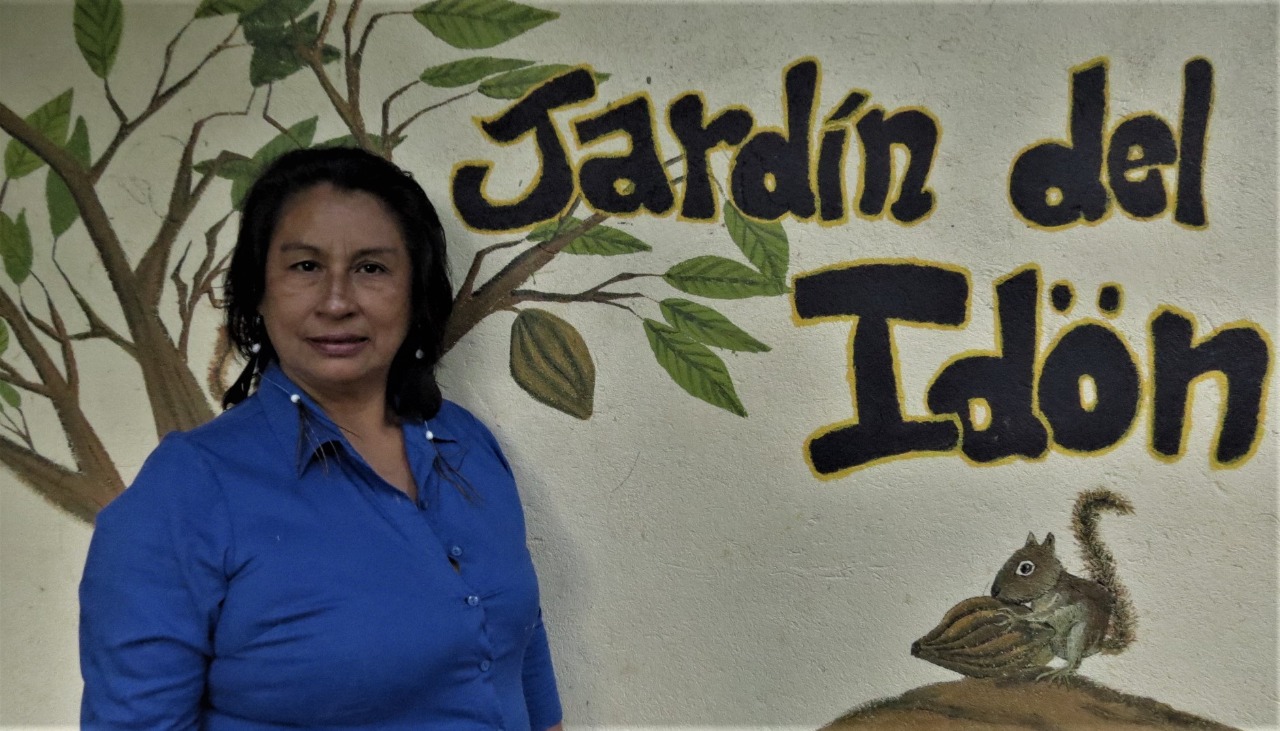04-03-2020
Feminism and tourism: discovering the stories of 7 great women
On the 8th of March 2020 we pay tribute to seven women who represent the feminist fight in the tourism field. From their area, social context and geographic place, our protagonists fight and claim feminism every day. An article by Núria Abellan, Carla Izcara, Alejandra López, Angélica Picado, Marta Salvador, Érica Schenkel and Angela Teberga.

In the past few years, women around the world have massively taken the streets to celebrate the 8th March, the International Day of Women. This movement gains strength in a journey where equality is demanded for all women in all social fields. As it has happened throughout history, gender keeps being an oppression thrust nowadays, impacting on multiple aspects such as representativity, labour conditions equality, division of reproductive labour, participation opportunities, among others. For this reason, in this article we highlight seven protagonist women of the 8th March. All of them are related in one way or another to tourism, with very different stories and fights but with a characteristic in common: their constant perseverance as a social force of change.
Clara Domínguez, leader and entrepreneur woman in CBT in Hornaditas, Jujuy (Argentina)
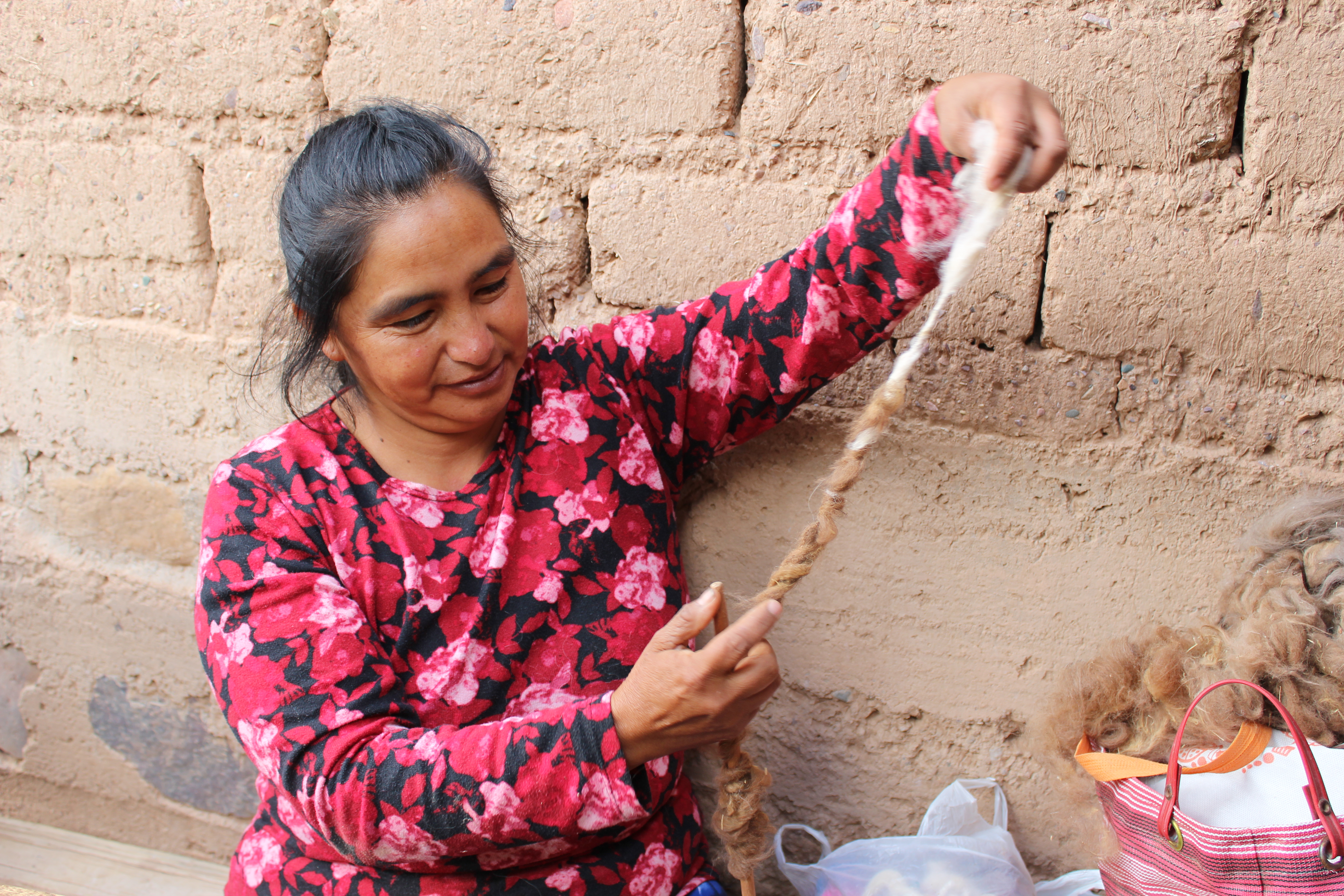
Rosângela Bandeira, a woman who turned her pain into a reason to fight
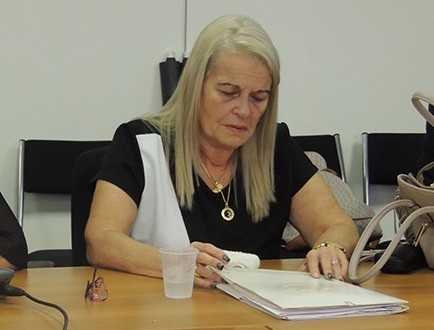
The 10th January 2020 marks the 10th anniversary of the death of the Brazilian crewmember Camila Peixoto Bandeira, murdered at 28 years old by the crewman and who was her partner, Bruno Souza Bicalho Vale Ricardo. The femicide took place at the beginning of 2010, in the cruise MSC Musica, in Brazilian jurisdictional waters. The reason was that the victim would have allegedly discovered the participation of Bruno Souza in drug trafficking and was going to report it to the authorities.
The fight of her mother, Rosângela Bandeira, has become public and emblematic. In the beginning, her effort was to prove that her daughter was murdered and she had not committed suicide as it was insinuated. Lately, her objective was to punish the murderer according to Brazilian criminal law. Unfortunately, nowadays Bruno is still free, sought by the Federal Political of Brazil and the Interpol for the crime which deeply affected the whole crewmembers at that moment.
Rosângela Bandeira, so shocked and devastated with the tragedy, started to lead a Brazilian movement of cruise victims, together with her son José Bandeira. In a short time, they have found other cases of crewmembers that have also been wronged by the huge cruise ship industry. There are cases of mysterious deaths, unfair firings, medical negligence in the cruise, moral and sexual harassment by the supervisors, freedom restriction, among others.
The Organization of Cruise Victims (OVC) was created in 2014 as an association of families, run by the Bandeira family, which makes an effort to improve the life and labour conditions of crew members. Its objective is to gather people with the purpose of acting and collaborating “for the eradication of a degrading work for the dignity of human people and/or similar to the slavery conditions, as the traffic of people with the objective of recruiting workers for services under these conditions in cruises, as well as to defend human rights of the members, victims of these types of practices in national and foreign territories” (OVC statute, 2014).
The creation of the Brazilian NGO was inspired by the North-American association International Cruise Victims (IVC), which had a decisive role in the creation of the law Cruise Vessel Security and Safety Act in North-American territory. The law, approved and sanctioned in 2010 by former President Barack Obama, has the objective of reducing crime and strengthening the investigation of the ones occurred on board. In this sense, shipowners are obliged to provide complete access to security cameras recordings, when authorities ask for them, and to use security devices that prevent people from falling overboard.
In Brazil, the OVC has had an influential political role from its foundation and has become an important channel to report labour irregularities on board. It has participated in many meetings and public hearings around the country to present the demands of crewmembers that have suffered all kinds of injustices. Moreover, the association has designed law projects, nowadays being processed in the Federal Senate, about the distribution of competences for the investigation of crimes which occurred on board, and also about the regulation of crewmembers profession and the application of the Brazilian labour legislation to the ship workers which are hired and work in national territory.
Rosângela Bandeiral, retired of 67, is a woman who turned her pain into a reason to fight. She is a fighter woman who has been for ten years, and for as long as necessary, struggling so that this horrible crime is not left unpunished. She is a supportive woman who embraces other causes of crewmembers who have also suffered and still suffer the injustices that take place in the open sea. Our humble tribute and solidarity for you, Rosângela.
Eulalia Corralero, initiator of the movement of the “Kellys Unión”
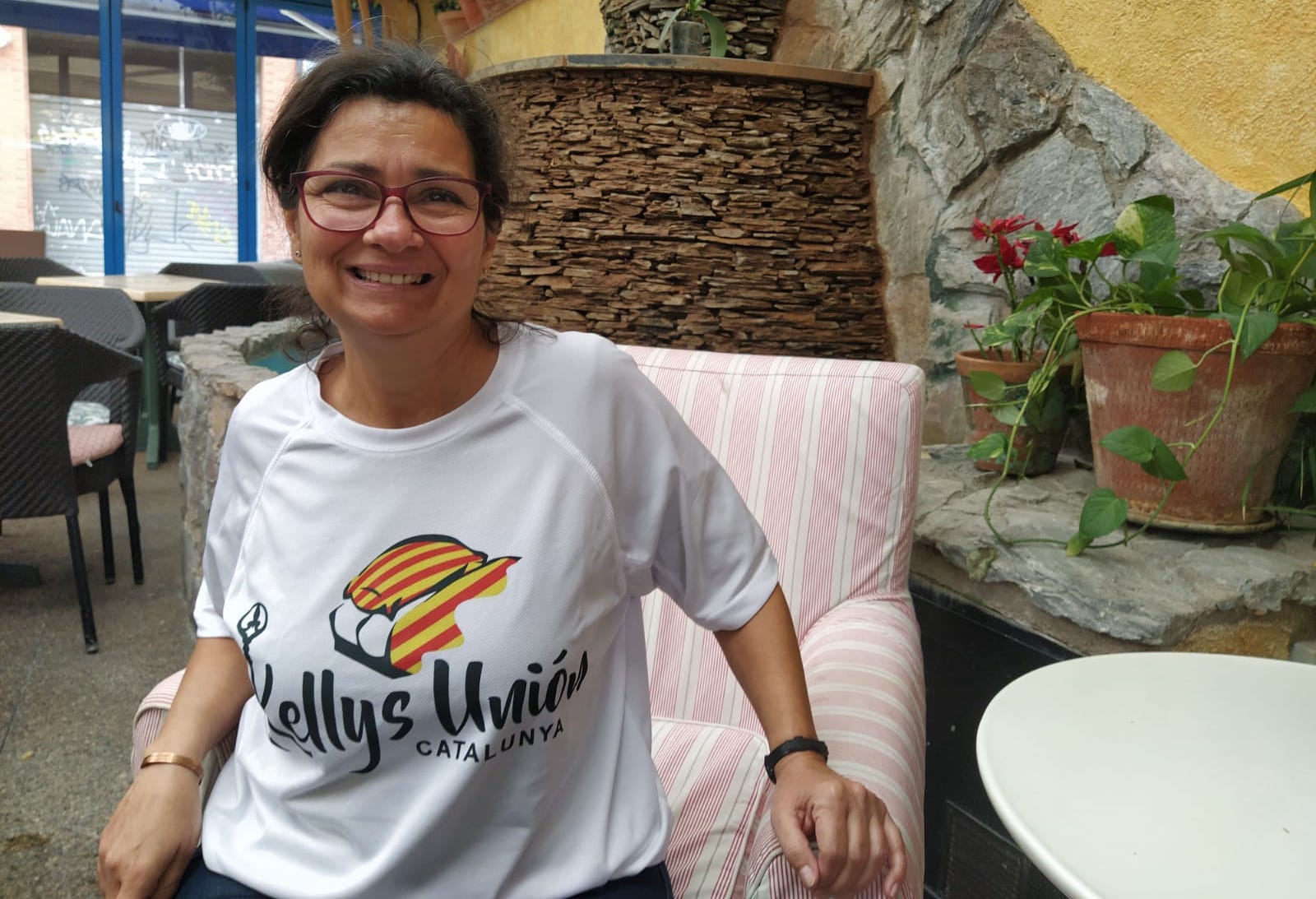
Eulalia, born in a little village in Extremadura, Spain, was forced to travel to Catalonia together with her six brothers in order to find work opportunities. At 14 years she already started to work in a private house, but, soon after, she moved to hotels as two of her older sisters. She started serving in the restaurant, but once she had her son, she moved on to be a housekeeper as the schedule was more compatible with family life. As she explains: “at that time it was a great opportunity and it was after some years we realized that we had lost our health working”.
Eulalia has worked for more than 30 years in a family hotel in the coastal village of Lloret de Mar (Catalonia). She was a union representative for a long time, but she always felt that unions did not entirely take her demands into account. It was in 2014 when, after reading the article of Ernest Cañada “Las que limpian los hoteles” (the ones who clean the hotels), she found someone who explained the health problems and work overloads that housekeepers suffered.
The idea that arose from the first meeting with a group of housekeepers in Lloret de Mar was the creation of a Facebook group called “Las Kellys”, which became a space for moral support and into a space to let off. Although they were not experts on social media, the group increased the number of members and therefore were able to create a support network at a national level. The complaints were always related to pain and physical exhaustion. Since the labour reform and the renovation of hotels, work conditions have deteriorated and they suffered a great work overload.
The name of “kellys” is an acronym of “the ones who clean”. With this name they wanted to demand the importance of their work and eliminate negative connotations related to reproductive and cleaning tasks. One year later, they realized that “kelly” in Gaelic means warrior. As Eulalia says: “it is what we do, it is not bad and it is very important. It is a decent work which deserves to be more valued and recognized. Being a kelly needs to stop being a negative thing”.
Due to the huge growth of the support group, they decided to create an association with the objective of improving labour conditions. Unfortunately, there were some disputes in the movement and Eulalia, president at that moment, was expelled from the association even though she had the support of an important sector of the “kellys”. From that experience, emerged the idea of creating different local associations to increase the level of implication and to deeply treat the specific problems. At the end of February 2020, four of these associations were legally constituted into a federation. For this reason, Eulalia expresses: “my idea is to unite all kellys and with this union be able to achieve change.”
Two of the main success of the fight of the last years that our protagonist highlights are: the recognition of three labour illnesses (carpal tunnel syndrome, bursitis and epicondylitis or tennis elbow), which makes it easier to take days off for a non-common labour illness, and the fact of improving the lives of many women. She confirms that “creating this network has prevented us from feeling alone when facing the problems, and has helped to recognize how important the role of the woman is in society”.
Nowadays their goal is to be able to retire after a certain amount of years worked, maintaining the rights and assurances. They also wish to keep advocating as an association and complementing the work of unions, since they can help them reach their objectives.
To finalize, Eulalia leaves a message for the readers: “let’s focus more on what unites us whether than on what divides us. If we are capable of this, we will be able to change society.”
Angelina Aspuac, a tribute to the struggle of Guatemalan weaving women

One of the common features of all the women present in this article and many others by which we raise our voices this March 8 is their ability to constantly fight. This adjective of persistent perfectly defines the following protagonist: Angelina Aspuac. Angelina was born in 1977 into a Kaqchikel family of farmers in southern Guatemala, a small-town Santiago Sacatepéquez.
Most Mayan women in this area are dedicated to the art of weaving, more specifically the waist loom. In Guatemala, this practice represents a place of memory and construction of a collective identity. In this way, ancestral fabrics are used to store cultural information but, at the same time, Maya dresses are also the bearers of a history of exclusion and resistance.
Angelina is currently a member of the National Weaving Movement and the Women's Association for the Development of Sacatepéquez (AFEDES), where she joined with only 21 years old. These organizations fight for the rights of indigenous women, who are often discriminated, marginalized and live in poverty. One of the struggles of AFEDES, along with other women weavers, is the presentation of a law initiative in the Guatemalan Congress in 2014 to protect Mayan fabrics, reforming five articles of the Copyright and Related Rights Act, the Industrial Property Law, the Protection and Craft Development Act and the Criminal Code. The main reason for this demand is that domestic and international companies are using these women-made fabrics as high-end clothing and accessories. That is why they demand recognition of indigenous peoples as intellectual authors so that communities can reach agreements with companies and obtain compensation for the use of their fabrics.
On the other hand, the Mayans have also been exploited by the Guatemalan Tourism Institute (INGUAT), which uses indigenous culture as a tourist attraction in the country, without compensating the communities for the revenue from their visitors. In addition, the Mayans are seen as a "folklore" culture without being recognized as an authentic Guatemalan culture, with even scenes of tourists dressed in indigenous clothing, which becomes a mockery to the communities.
This struggle, which largely involves poor working women, occurs twenty-four years after the 1996 Peace Accords put an end to the Guatemalan Civil War, which claimed 200.000 lives, accounting for 83% of these Mayans. That is why this March 8 we pay tribute to the weavers who are fighting for equal rights and the recognition of their place in society and, especially, Angelina Aspuac for her work of struggle and constant force.
Margalida Ramis, thinking of a post-capitalism society from Mallorca
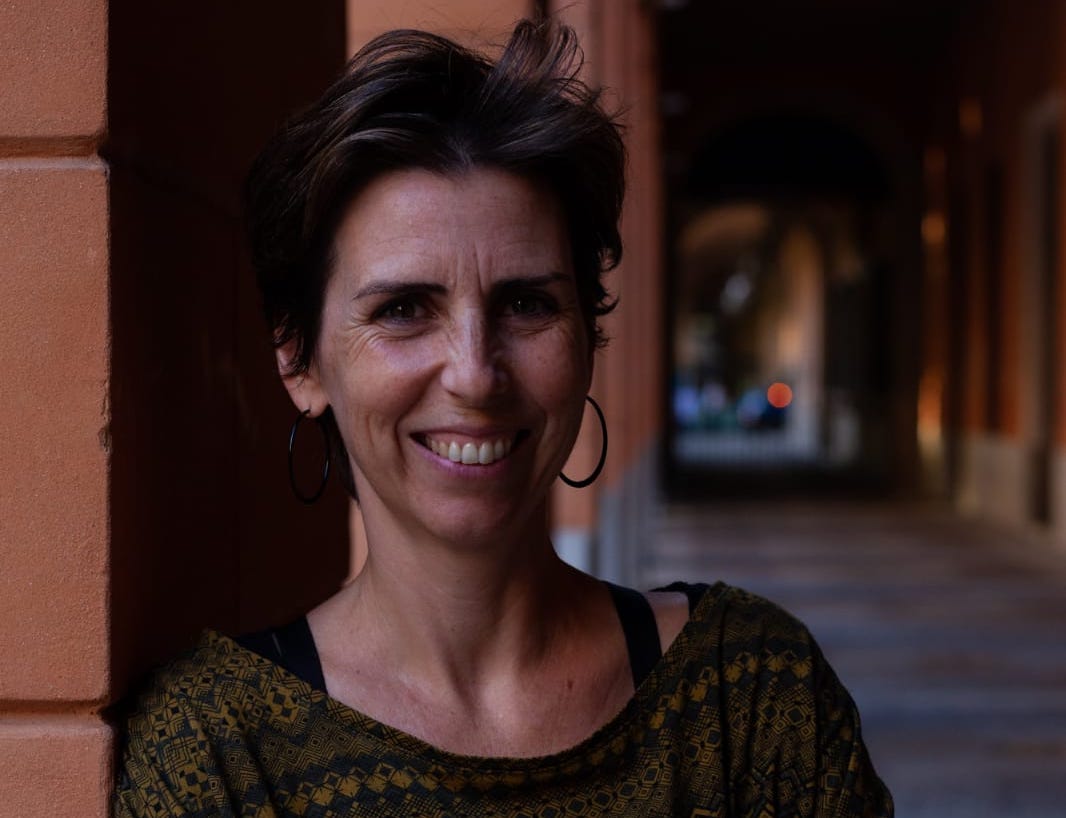
Yayo Herrero, Alicia Puleo, Ruth Escribano, Angélica Velasco, Alba del Campo, Margalida Ramis… These are some names that shape a large list of women that have dedicated and dedicate their life and their task to ecologist activism. Margalida is nowadays and from 2007 the responsible and spokeswoman of the area of territory and natural resources campaigns of the Grup Balear d’Ornitologia i Defensa de la Naturalesa (GOB), ecologist entity of reference in the Balearic Islands.
Born in Sa Pobla, Mallorca, in 1976, she earned her degree in Physics in the Universitat de les Illes Balears and from ecologism she developed a project focused on renewable energies in Menorca, which later was applied in Mallorca too. From this experience, and with the growing concern for the link between ecologism and society, she created Enginyeria Sense Fronteres Illes Balears, an entity with who she developed international cooperation projects in the framework of social ecologism.
Lately, working as a consultant of waste management, arose the opportunity to be part of the GOB, focusing on territory, urbanism and resources campaigns linked to the process of growing touristification in Mallorca. Nowadays the GOB is propitiating spaces of reflection to rethink the situation of tourism dependency and overexploitation of natural resources, ignoring the economic diversification of the island, which could generate a diverse and strong economy, centred on the sustenance of life from the island’s own resources. These gatherings come induced by the situations of climate emergency, such as the storm Gloria or episodes that have become a threat to the tourism of the island, such as Brexit or the collapse of Thomas Cook. These scenarios show the vulnerability of an economic and social model, but they are also an opportunity to create awareness and social movement, trying to answer some questions like: if we do not live from tourism, what do we live from?, How do we organize?, How do we recover professions linked to territory?, How do we sustain lives that are worth living?, etc.
Meanwhile, Margalida has actively participated with the Col·lectiu Tot Inclòs, a self-managed group from which damages and consequences of the tourism industry in the Balearic Islands are critically analysed. The group has elaborated during some years an annual monographic and, in 2018, culminated its work with the presentation of the documental Tot Inclòs, where the reality is read different and, for the first time, the causes of the current situation are questioned, it is, the own tourism model instead of just its effects. The growing critics of the economic model based on the monoculture tourism have promoted the joining of a great number of social movements who, up until that moment, had worked independently to revert the consequences of a predatory tourist model. Some examples can be young people of the island with problems to access housing, the “kellys” or farmers who face troubles to continue living from their work, among many others.
Together with this shift in perspective, Margalida stablishes a turning point in her work as an activist in the fact of entering in contact with ecofeminism. Firstly, through a course of feminist urbanism, promoted by the Col·lectiu Punt 6, resignifying ecological concepts with a gender perspective. Secondly, getting closer to the ideas of Marusia López, Mexican advocate for Human Rights, and Lolita Chávez, Guatemalan environmentalist and feminist advocate currently exiled. They both contributed to her discourse with concepts such as the identification with nature, community task and a profoundly anticapitalistic and antipatriarchal cosmovision. Through both encounters, she goes deeper into other fields of feminisms, such as the feminist economy with Amaia Pérez Orozco, the reading of Silvia Federici, the role of media with Meritxell Esquirol, or decolonial feminisms. All this knowledge, she confirms, has taken to review herself and wonder about her thoughts and her life, in a process of continuous learning.
As future challenges, she confirms that these logics need to be applied to entities such as GOB, which although they keep developing tasks of great importance and political influence in the defence of territory, now need to go a step further. The ecofeminist discourse should entail the opening of processes to review the internal functioning of social entities, which are still notably patriarchal. At the same time, the privileges of the members and their dynamics when acting should also be reviewed. As Margalida concludes, accepting that capitalism has reached its peak, ecofeminism is the framework that allows us to think of a post-capitalistic society.
Agnès Rodríguez, in defence of the profession of tourism guides
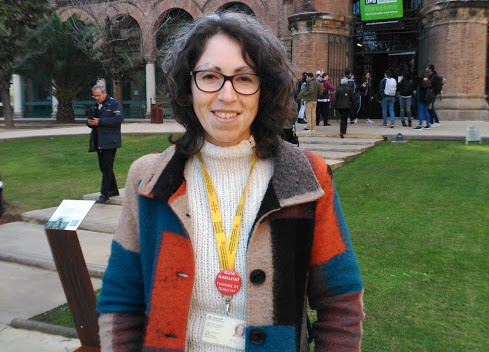
Agnès Rodríguez is a woman that defines herself as open, careful, resolutive, talkative and bossy. These are some of the qualities that she integrates into her profession, as Agnès is a guide in Catalonia and Barcelona, her native city, although sometimes she expands the frontiers abroad, specially towards Norway and Canada. She is qualified as a guide by the Generalitat de Catalunya, she speaks five languages and has thirteen years of experience in this profession around the world (Czech Republic, Croatia, Belgium, among others). Despite enjoying her trade very much, it has not always been her first choice. She studied history in the university and worked in many things not related to tourism, in exception of a job as an entertainer in a hotel, where she already showed her resolutive and communicative abilities. Some years later, from her fascination with the profession, she studied a guide module and subsequently got her guide license.
Agnès presents herself as a person worried about the well-being of the city and its citizens, aware of the impacts of tourism and knowledgeable of its limitations, aspects that she tries to share with the visitants she guides through the city and the companies she works with. Moreover, she is part of a fight for the dignification of the guide profession and against the precarious labour conditions which they are submitted to. This is done by the Association of Tourist Guides of Catalonia (AGUICAT), of which she has been president for the last two years.
This association is formed by 371 members and works for a responsible, respectful and quality tourism, through the experience of the tourist and, specially, through the labour conditions and satisfaction of tourism guides. Through the work carried out by AGUICAT, the profession has been made visible in schools, monuments and institutions. It has also been fought for those who are dedicated to being a guide to carry out quality work, transmitting truthful information and collaborating in improving the working conditions of the union, while emphasizing the need to pass a knowledge test in order to become qualified as a guide.
Agnès affirms that she feels very proud of the work carried out by AGUICAT and that, even nowadays she has made way to a new board, Agnès expresses her intention to continue raising her voice on an individual level, not only for the guide profession or on behalf of the tourism activity in general, but also for the welfare of the city.
Elides Rivera, the fight, the resistance and the persecverance of indigenous women
Far away you can hear the cicadas singing, the sound of the birds, in a rainy climate in those September days in Costa Rica. Elides asks if we drink sipped coffee, which is the best for her to accompany a conversation. She is passionate about taking care of her garden and the nature around her. The struggle to defend her territory has led her to lead various activities as a community manager.
Elides Rivera is an indigenous woman native from the village of Teribes or Térraba (Brörán), located in the Pacific South of Costa Rica, in the province of Puntarenas. At 53 years old she is at the front of the presidency of the Association of Women Hand of Tiger, which is integrated by 12 women and is a cultural centre which offers activities linked to etnotourism and educational tourism. Although she could not complete her high school studies, she always liked to read about topics related to her culture and woman’s leadership. As she affirms: “The association of women was born to make more visible the economic part without leaving apart the spirit of fight, resistance and persistence that we, as ingenious women, have.”
Elides wakes up very early in the morning to feed her chicken and pigs. Socioeconomic conditions in the family and community have always been unstable, she asserts: “In the association we work for the welfare of lots of women both inside and outside the territory, in this fight to recognise that we are women subjected of rights and we deserve to have a decent life.” Moreover, in the eighties the project of the Hydroelectric Boruca arrived, with feasibility studies promoted by the Instituto Costarriqueño de Electricidad (ICE). Although they were not prepared, local villagers resisted the project. From there they learned that “it was important to strengthen the economic part because the social fight requires time and resources. You get home and there are your children, grandchildren and the necessities are not covered.”
Elides openly recognises that tourism has not only strengthened its economic situation but also its social cohesion and women's organizational capacity. Her active participation in the association has also led her to be part of the Río Térraba defence that her community has made against the Diquís Hydroelectric Project. When she was a child, she learned in school the importance of reaffirming her identity: "You are Chola, you are an Indian" was told by the "others". This motivated her to never be ashamed of her roots, which she has managed to pass on to other women in the community and her descendants. The firmness of her words impregnates her face, her features and her gestures that have always accompanied her and defining her: "As women, we are called to maintain the spirit of our people; I thank my ancestors to gift me my identity and not be ashamed of who we are."
The fight for indigenous rights keeps coming alive in Costa Rica. Elides is one of the women of the village Térraba that has been threatened by the defence of her rights. For her and for all the women that defend their spaces of life we dedicate this tribute.

